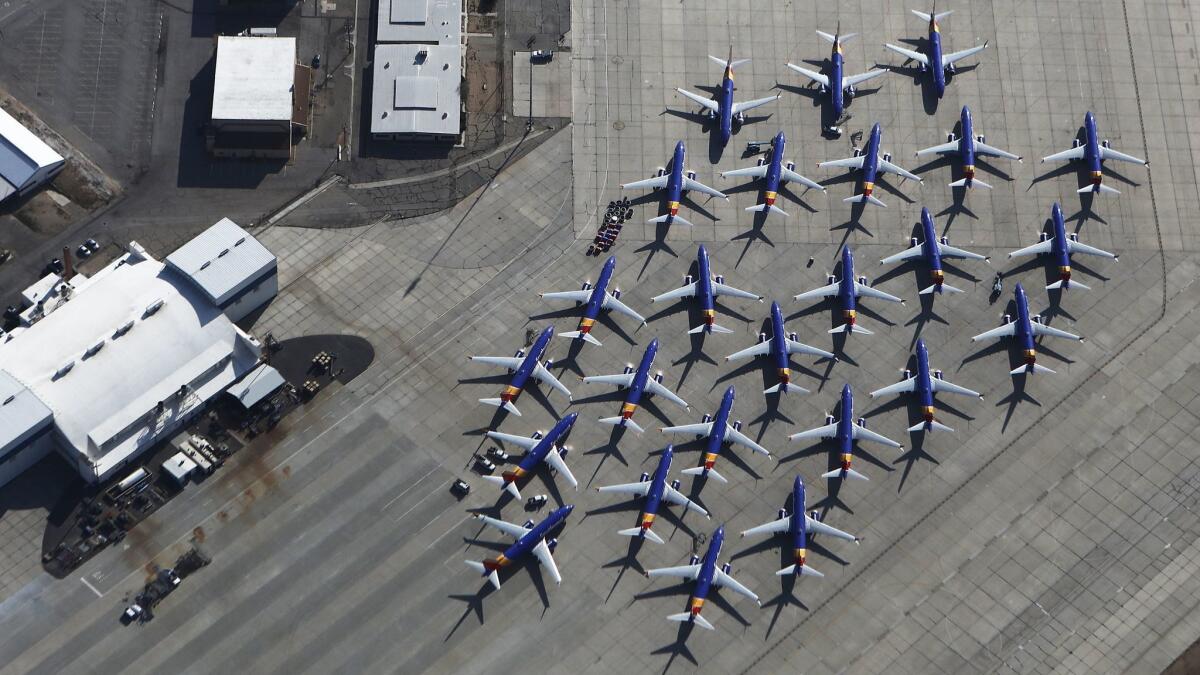Boeing expects 737 Max to remain grounded several more months

Boeing Co. announced Tuesday that its grounded 737 Max would not be cleared to fly until the middle of this year — months later than previously anticipated — in a new delay that will add to the company’s financial burden. Its stock price slid to the lowest level in more than a year.
The new expectations come as the plane maker addresses two recent setbacks for the embattled Max: a software flaw that will require more work than expected and an audit saying some wiring on the plane needs to be rerouted. The final determination remains in the hands of the U.S. Federal Aviation Administration, Boeing said in a statement.
The latest timeline deepens the challenge for Boeing as new Chief Executive David Calhoun works to repair frayed relationships with customers, suppliers and regulators. His predecessor, Dennis Muilenburg, was ousted in December as it became apparent the company would miss its goal of recertifying the Max in 2019. The Max was grounded in March after the second of two deadly crashes that killed a total of 346 people.
Boeing shares slid 3.3% to $313.37 on Tuesday, the biggest decline on the Dow Jones industrial average.
The new timetable “is subject to our ongoing attempts to address known schedule risks and further developments that may arise in connection with the certification process,” the company said. “It also accounts for the rigorous scrutiny that regulatory authorities are rightly applying at every step of their review of the 737 Max’s flight control system,” including new pilot-training requirements.
The FAA hasn’t set a time frame for completing work on the Max. “We continue to work with other safety regulators to review Boeing’s work as the company conducts the required safety assessments and addresses all issues that arise during testing,” the agency said in a statement.
With the delay, Boeing’s best-selling jet will miss a portion, or possibly all, of the busy summer travel season for the second straight year. That will add to the compensation that the U.S. plane maker is likely to pay airlines.
Calhoun, a former senior executive at General Electric Co. and Blackstone, stepped into the top job at Boeing on Jan. 13, emphasizing transparency and a streamlined organization. His plans for turning around the company will be in the spotlight when Boeing reports its fourth-quarter earnings Jan. 29.
Also this week, people familiar with the matter said Boeing was close to securing a $10-billion loan.
The financing could still be increased if demand from investors exceeds the target size, the people said. Commitments are due by the end of this week, said the people, who asked not to be named because the details weren’t public. The loan will have a maturity of two years and will include a delayed-draw structure in which the borrower can access the funds at a later date, they said.
Citigroup Inc. is leading the discussions with lenders, Bloomberg News reported a week ago. CNBC reported Monday on the deal size.
Officials at Boeing and Citigroup declined to comment on the transaction.
Pricing on the loan is to be based on Boeing’s credit rating — which is presently at A3 by Moody’s Investors Service. The ratings firm has placed Boeing’s senior unsecured debt on review for downgrade, saying it could face a “costly and protracted” recovery and “heightened operational and financial risk.”
Fresh funding would help Boeing contend with growing financial strain as it reimburses customers, keeps suppliers afloat and maintains about 400 newly built Max planes that it can’t deliver until global regulators clear the jet to fly. A production halt taking hold this month on the Max is a sign that its emergence from the crisis will be lengthy.
The new financing comes on top of $9.5 billion in revolving credit facilities signed in October, which at the time doubled the size of the company’s existing credit lines. Investment-grade companies typically leave their revolvers undrawn to serve as a form of backup liquidity.
The long-term grounding of the Max cost the company its title as the world’s largest plane maker, after the number of jetliners it delivered in 2019 dropped to less than half of rival Airbus’ tally.
More to Read
Inside the business of entertainment
The Wide Shot brings you news, analysis and insights on everything from streaming wars to production — and what it all means for the future.
You may occasionally receive promotional content from the Los Angeles Times.







